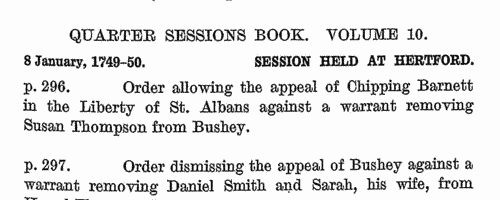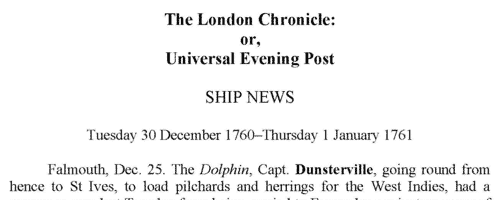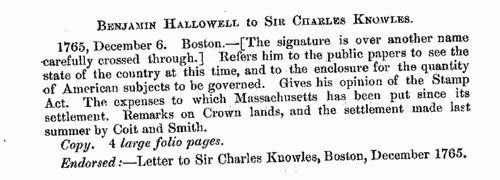Our indexes include entries for the spelling christy. In the period you have requested, we have the following 184 records (displaying 11 to 20):
Hertfordshire Sessions
(1700-1752)
Incidents from the Hertfordshire Sessions Books and Minute Books. These cover a wide range of criminal and civil business for the county: numerically, the the most cases (240) concerned assaults; presentments about repairs to roads and bridges (67); larceny (63); unlicensed and disorderly alehouses (33); nuisances (28); and trading without due apprenticeship (24). This calendar gives abstracts of all entries in the Sessions Books and Minute Books for Hertfordshire sessions for the period. | Sample scan, click to enlarge

|
 Apprentices registered in Scotland
(1750-1754) Apprentices registered in Scotland
(1750-1754)
Apprenticeship indentures and clerks' articles were subject to a 6d or 12d per pound stamp duty: the registers of the payments usually give the master's trade, address, and occupation, and the apprentice's father's name and address, as well as details of the date and length of the apprenticeship. There are central registers for collections of the stamp duty in London, as well as returns from collectors in the provinces and from Scotland. (The sample entry shown on this scan is taken from a Norfolk return) | Sample scan, click to enlarge

|
 Masters of Apprentices registered in Scotland
(1750-1754) Masters of Apprentices registered in Scotland
(1750-1754)
Apprenticeship indentures and clerks' articles were subject to a 6d or 12d per pound stamp duty: the registers of the payments usually give the master's trade, address, and occupation, and the apprentice's father's name and address, as well as details of the date and length of the apprenticeship. There are central registers for collections of the stamp duty in London, as well as returns from collectors in the provinces and in Scotland. (The sample entry shown on this scan is taken from a Norfolk return) | Sample scan, click to enlarge

|
 Apprentices registered in Scotland
(1759) Apprentices registered in Scotland
(1759)
Apprenticeship indentures and clerks' articles were subject to a 6d or 12d per pound stamp duty: the registers of the payments usually give the master's trade, address, and occupation, and the apprentice's name, as well as details of the date and length of the apprenticeship. There are central registers for collections of the stamp duty in London, as well as returns from collectors in the provinces. These collectors generally received duty just from their own county, but sometimes from further afield. The indentures themselves can date from a year or two earlier than this return. (The sample entry shown on this scan is taken from a Bristol return. Each entry has two scans, the other being the facing page with the details of the indenture, length of service, and payment of duty.) IR 1/53 | Sample scan, click to enlarge

|
Masters of Merchantmen (1761)
The London Chronicle carried general shipping news, as well as lists of arrivals at vessels at various continental and American ports. Shipping on the western approaches suffered daily depradations by an infestation of French privateers, and the coastal and foreign trade was largely carried on by convoy protected by the Navy. It was remarked that 'insurance has risen on account of the great swarms of our enemies' privateers'. January 1761
| Sample scan, click to enlarge

|
 Masters of apprentices registered in Scotland
(1762) Masters of apprentices registered in Scotland
(1762)
Apprenticeship indentures and clerks' articles were subject to a 6d or 12d per pound stamp duty: the registers of the payments usually give the master's trade, address, and occupation, and the apprentice's name, as well as details of the date and length of the apprenticeship. There are central registers for collections of the stamp duty in London, as well as returns from collectors in the provinces. These collectors generally received duty just from their own county, but sometimes from further afield. The indentures themselves can date from a year or two earlier than this return. (The sample entry shown on this scan is taken from a Bristol return. Each entry has two scans, the other being the facing page with the details of the indenture, length of service, and payment of duty.) IR 1/54 | Sample scan, click to enlarge

|
 Masters of clerks and apprentices
(1774) Masters of clerks and apprentices
(1774)
Apprenticeship indentures and clerks' articles were subject to a 6d or 12d per pound stamp duty: the registers of the payments usually give the master's trade, address, and occupation, and the apprentice's name, as well as details of the date and length of the apprenticeship. 1 January to 31 December 1774. | Sample scan, click to enlarge

|
British administration in North America
(1755-1776)
The papers of the 2nd Earl of Dartmouth, who served as Secretary of State for the American Department, contain correspondence relating to North America and the West Indies. They include some material earlier than 1755. | Sample scan, click to enlarge

|
 Clerks and apprentices
(1782) Clerks and apprentices
(1782)
Apprenticeship indentures and clerks' articles were subject to a 6d or 12d per pound stamp duty: the registers of the payments usually give the master's trade, address, and occupation, and the apprentice's name, as well as details of the date and length of the apprenticeship. 2 January to 31 December 1782. IR 1/31 | Sample scan, click to enlarge

|
 Clerks and apprentices
(1783) Clerks and apprentices
(1783)
Apprenticeship indentures and clerks' articles were subject to a 6d or 12d per pound stamp duty: the registers of the payments usually give the master's trade, address, and occupation, and the apprentice's name, as well as details of the date and length of the apprenticeship. 23 June to 31 December 1783. IR 1/32 | Sample scan, click to enlarge

|
Research your ancestry, family history, genealogy and one-name study by direct access to original records and archives indexed by surname.












